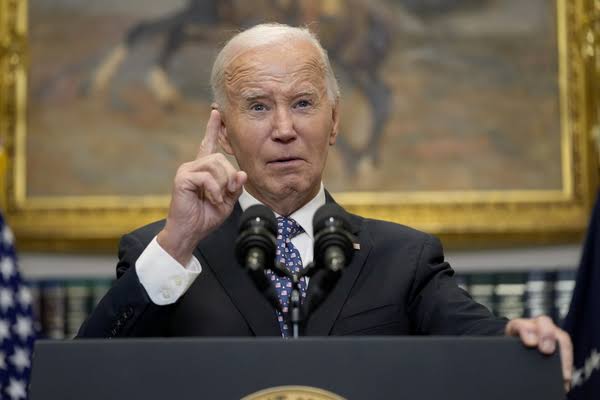On Wednesday, President Joe Biden firmly stated that he will not support an Israeli strike on Iran’s nuclear sites in retaliation for Iran’s missile attack on Israel.
Biden’s Warning on Israeli Strike
This came after Iran launched approximately 180 missiles at Israel, escalating tensions in the region. When asked by reporters if the U.S. would back such a military action by Israel, Biden clearly responded with a decisive “No.”
This response aligns with Biden’s efforts to control the situation through diplomatic means rather than direct military action. The missile attack by Iran followed a complex regional issue involving Israel and Tehran, but Biden has emphasized the importance of avoiding an escalation that could spark a larger conflict. His administration has taken a position of restraint, seeking other measures to address the missile barrage.
Group of Seven Discussions on Iran
Following the Iranian missile strike, Biden and other leaders from the Group of Seven (G7) nations held a conference call to discuss coordinated sanctions against Iran. This group, which includes Canada, France, Germany, Italy, Japan, and the United Kingdom, stood in strong condemnation of Iran’s actions. In their meeting, they expressed deep concern about the potential for the conflict to spread, emphasizing that it is in no one’s interest to see a regional war.
Biden reinforced that the United States stands in complete solidarity with Israel and its people in this time of tension. He acknowledged that steps must be taken to respond to Iran’s actions but reiterated that military intervention by Israel on Iranian nuclear sites is not the answer he supports.
A key part of the discussions was the announcement of new sanctions that the G7 countries plan to impose on Iran. These sanctions aim to pressure Iran without further military escalation. Biden indicated that these sanctions would likely be revealed soon, marking a unified response from the global powers. This measured approach highlights the administration’s preference for economic and diplomatic tools over military ones.
Iran-Backed Iraqi Militias Warn US Against Action on Iran
Concerns of a Larger Conflict
Biden has been keen to avoid further inflaming an already precarious situation. During his remarks, he shared that discussions with Israel were ongoing, particularly regarding what actions they might take in response to the missile barrage. However, Biden and his administration are urging caution. They are carefully considering the potential consequences of any aggressive response, particularly one that might involve striking Iran’s nuclear facilities.
Other G7 leaders echoed these concerns, notably Italian Premier Giorgia Meloni, whose country currently holds the rotating presidency of the G7. In a statement, Meloni emphasized that a broader conflict would not benefit anyone, underscoring the fragile nature of the current situation in the Middle East.
Intense Missile Clash: Iran Fires 180 Missiles at Israel
Despite these tensions, Biden reassured the public that the U.S. fully supports Israel’s right to defend itself. While there is a shared understanding among the G7 nations that Iran’s missile attack cannot go unanswered, the approach favored by Biden is one of caution and strategy, relying on sanctions and other non-military responses.
U.S. and Israel Collaboration on Response
As the situation develops, Biden’s administration has signaled a collaborative approach with Israel to determine their next steps. Deputy Secretary of State Kurt Campbell pointed out that a return message to Iran is inevitable, though what form that response will take remains a subject of ongoing discussions. He also acknowledged the delicate nature of the situation, describing the region as “balancing on a knife’s edge.”
The U.S. played a crucial role in helping Israel defend against the recent Iranian missile attack, which was reportedly carried out in retaliation for the killing of Hezbollah leaders supported by Tehran. This defensive aid underlines the strong partnership between the two nations, but Biden is clearly urging Israel to weigh its response carefully, particularly with respect to any potential military strikes on Iran.
While the Biden administration agrees that a response is necessary, officials are weighing the broader implications of how such actions could impact the stability of the entire Middle East. Campbell expressed the importance of a proportionate and carefully calculated response to prevent further destabilization in the region.
Biden is also expected to speak directly with Israeli Prime Minister Benjamin Netanyahu soon, as they continue to navigate the evolving crisis. It is evident that Biden’s administration is striving to find a balance between supporting Israel’s right to defend itself and avoiding actions that could push the region into deeper conflict.
The administration’s approach is to carefully manage the situation through sanctions and diplomacy while keeping military action off the table as much as possible. However, the coming days may reveal more about how Israel plans to react and what further steps the U.S. will take to support its key ally in the region.
This restraint by Biden sends a message that while the U.S. is firmly allied with Israel, it also recognizes the need for a more nuanced and measured approach in handling the dangerous situation that has emerged in the Middle East.


